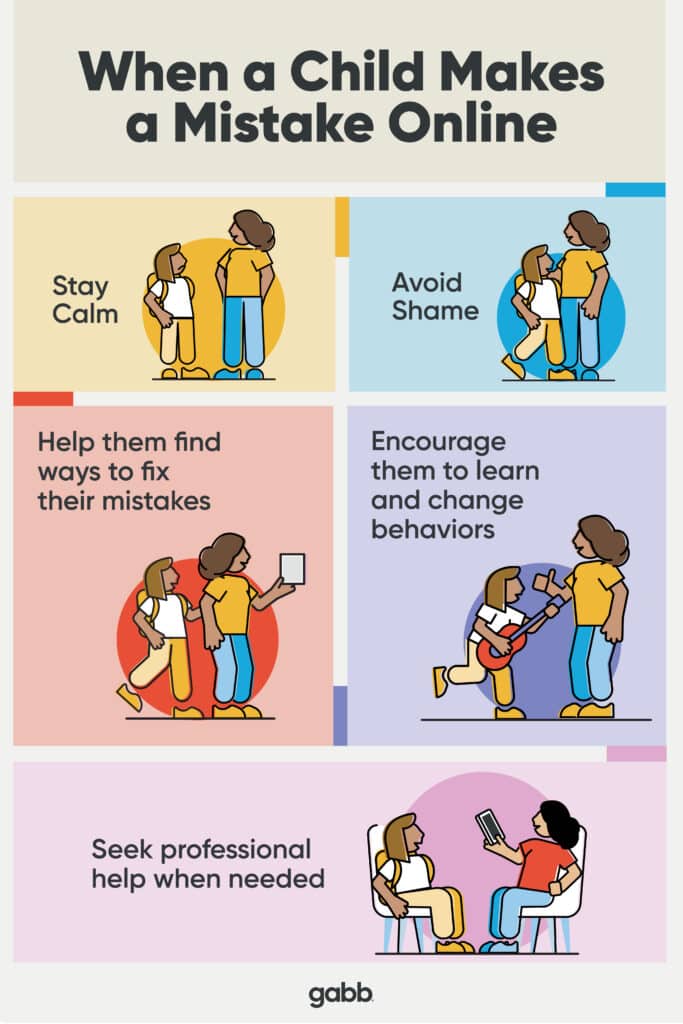Kids make mistakes, and it’s part of growing up. For most generations, those mistakes were seen by a handful of people and forgotten after a few days.
Today, kids have more pitfalls to avoid both in person and online. The digital permanency of online mistakes can be more serious and costly.
Although parents may teach their children important digital citizenship skills such as avoiding cyberbullying, sextortion and pornography, kids may still make mistakes online.
When kids make mistakes online, parents can do their best to stay calm, help them fix their errors and encourage them to learn from the mistake.

1. Stay Calm
Parents may feel a range of emotions when finding their child did something inappropriate online, but the first key is to try to stay calm and not release your anger at the child.
Despite your initial feelings about their actions, staying calm in front of them helps them to be more likely to come to you for the help they need.
You may assure them of your love, and then ask for an hour or a day to process what you just learned.
You can take your feelings out on a punching bag or do a meditation, but when you face your child about this again be in a headspace to be as calm as possible.
If you did let your feelings out on the child, it’s never too late to apologize and start off on a better foot as you help them. Kids learn a lot when parents apologize and do better.
Why is this so important? If they know they will be met with unhealthy anger or hostility, they are more likely to clam up and avoid letting you in.
Furthermore, kids are often harder on themselves than parents are. They may be feeling angry over their decision, or telling themself they are a failure for letting you down.
Help them see their self-worth is inherent and not tied to their mistakes. Everyone trips up sometimes and we all can pick ourselves back up and learn from it.
2. Avoid Shame
Shame is a corrosive feeling that erodes self-esteem and makes people more prone to addiction and mental health struggles.
Parents who avoid shaming their children and model positive self-talk provide a healthier environment for kids to thrive.
Shame vs. guilt
Shame and guilt are often talked about together, but each is different. Guilt can be a healthy response to an error, while shame has been linked to addictive behaviors, anxiety, and depression.
Researchers determined that shame is a “nonmoral negative self-evaluation” while guilt is a concern for a harmful behavior or attitude. Guilt is a private experience while shame is a public experience.
Shame researcher Dr. Brene Brown explains, “Shame is ‘I am bad.’ Guilt is ‘I did something bad.’”
Parents can be careful to avoid shame. Statements such as “You are a bad person because..” can be altered to a healthier, “You are a good person who made a wrong choice. I am here to help.”
Guilt has been researched to encourage people to grow from and fix their mistakes.
Do guilt trips help kids?
Parents don’t need to make their child feel guilty—a guilt trip is one of the most ineffective parenting strategies.
Often, what parents think is a “guilt trip” is actually crossing the boundaries into shaming. Shame is believed to leave a person powerless in feeling they are a bad person and that their moral standing cannot be changed.
Most kids will feel a healthy dose of guilt all on their own, and what they need most is parents who reassert their love and help the child fix their mistakes.
3. Help Them Fix Their Mistakes
Most kids can be supported by caregivers as they make a plan to right their wrongs.
This will vary depending on the child’s development and the error made, and parents will know best how much to support and how much to let the child lead these efforts.
Some errors may come with legal consequences, including sharing explicit images or cyberbullying. Thankfully for children under 18, in many situations these repercussions will not carry on their record into adulthood. This can help teens learn and move on.
With digital permanency, some mistakes are harder to erase. If your child shared an explicit image, it can be hard to keep it from being shared online. But there is hope. A new tool called Take It Down helps remove nude images of minors that were posted or shared online.
With the help of a parent or caretaker, kids are best equipped to build digital resiliency.
4. Seek Professional Help When Needed
Parents can provide extra support for their children and themselves by getting professional help when needed
Resources such as Thorn are available for parents. When looking for a therapist for a child, Teen Counseling and Psychology Today are good resources.
Conclusion
Avoiding the dangers online in the first place is the ideal option. Prevention is more effective than damage control. In fact, this is such a fundamental part of online safety that all Gabb devices are built with that philosophy.
But good kids with good parents are susceptible to mistakes. If parents discover their child has made mistakes online, they can choose to be allies and provide a safe place for a child to learn.
Staying calm, avoiding shame, and doing our best to help our children fix and learn from their mistakes is key.
No mistake is too large to recover from, and teens can be reassured there is always hope. If you sense your child is feeling hopeless and considering self harm, get help immediately. Call 988 or go to the nearest emergency room.
What do you think is the best way to help children avoid mistakes online? Let us know in the comments!









Success!
Your comment has been submitted for review! We will notify you when it has been approved and posted!
Thank you!